Choosing AI review reply software comes down to 6 factors in my opinion
- Fixed pricing models (avoid credit-based schemes that hide costs),
- Easy prompt iteration and testing
- Context and memory management
- Integrations for human oversight
- True multi-language support
- Proven track record, without 20 years of technical debt
This guide reviews the top 10 solutions across the spectrum.
Older players like BirdEye, Grade.us, Reputation.com, and Podium offer comprehensive suites but lack sophisticated AI.
More recent, mid-market options like Reviewflowz & ReviewTrackers tend to provide better AI features, but might not have as advanced reporting as Enterprise features.
There are also a wide number of newer players. I decided only to include one in this guide – RightResponseAI – because most of the solutions are basic chat GPT wrappers that don’t really make the cut on most of these criteria.
Some tools in the guide don’t have AI capabilities like BrightLocal or Grade.us but it was important to include them since they fit the bill better than most recent wrappers in terms of automation capabilities. Ultimately, this is about getting a job done, it’s not about using AI, right?
What to look for in AI review reply software
1. Fixed pricing model
Most solutions listed here work with a fixed pricing model, and don’t charge for each reply posted or generated.
But you can still occasionally find solutions that implemented “AI credits” – which are often defined in a pretty obscure way but essentially are tied to an output generated by AI.
For example, an AI reply might cost you 2 credits.
These pricing models come with high uncertainty.
What happens if you suddenly get bursted with 200 reviews?
But most importantly, what this pricing model tells you is that they have very low visibility on their cost structure.
Usually, this tells you they basically just slammed a User Interface (UI) on chat GPT, and need variable pricing because they’re so dependent on external APIs.
In general, look for a fixed pricing model.
Anyone trying to justify a variable model is either trying to lure you in to end up charging tons of overages and hidden costs they never mentioned, or selling a Chat GPT wrapper and barely making a living because of an insane Open AI bill – which obviously can’t last very long.
2. Easy prompt iteration & testing
You might see the occasional player claiming they have the best AI model for review replies or something absurd like that.
The thing with model quality is that it’s kind of like blockchain back when crypto was trendy. Everyone can say their model is the best, knowing full well that nobody’s going to ever audit it properly. For instance I can tell you we use a blend of 3 models we trained on a dataset of 5M reviews and replies from 32 different review platforms in every industry we could think of.
But really, does that tell you anything about your replies?
Reality is you’ll iterate over your prompt until you get replies that are satisfactory to you. You can do that with the best LLMs, or with chat GPT 4o, you’ll still get a good result if you run through enough trial & error.
So what actually matters is how hard it is to test and update your prompt.
Are you able to test your prompt on past reviews? How easy and convenient is it? How fast does the prompt update? How sensitive is the AI to your prompt? These are the questions that really matter if you want to guarantee on-brand, satisfactory replies.
3. Context & Memory Management
If you want to make sure you introduce diversity in your replies, some solutions have a “diversity” setting or something similar. This controls “temperature”, which is a way to control how predictable or varied a language model's output is. The problem is the higher the temperature, the less accurately the model will follow its instructions.
And when replying to reviews, you’ll want to introduce diversity in the reply itself, but you don’t want the model to invent contact email addresses and phone numbers, or to outright disrespect your customers. So it’s actually very important that the model has near-zero temperature.
The only way to introduce reply diversity is to ask the AI to randomly choose between different options (examples).
But for this to work, you need the AI replying to reviews to have access to your past reviews, and replies.
The reason for this is that LLMs are probabilistic models. This means that if you ask it to randomly choose between 3 sentences, it will always pick the same sentence, which is the one it thinks has the highest probability of being the best.
The vast majority of solutions don’t support this. I’ll point out the ones that do in this list.
4. Integrations for human oversight & easy intervention
It’s easy to forget about humans when shopping for AI tools.
It’s one thing to reply to reviews, but you’ll want to keep an eye on what’s going on, and you might even want to reply manually to the more challenging reviews. That’s where integrations with your CRM, Help desk, or with instant messaging solutions like Slack or Microsoft Teams come in.
But AI tools also face the number one challenge software has been facing for decades: user adoption.
So it’s important that they can do this from the tools they already use everyday – like helpdesks, Slack, Microsoft teams, or even email.
Smart review alerts, with proper filters, and reply options are key for a successful process.
5. Multi-language support
This goes both ways.
First, the AI needs to understand the review. If there are language specific idioms, it needs to pick up on them and understand the implied meaning.
Second, you might want the replies to be posted in the same language as the review. Especially in the B2C & Software industries, that are often multi-lingual by nature.
That’s where true multi-lingual support matters.
Most AI-native tools will handle this pretty well, but legacy software solutions often have high technical debt on the translation side of things. You’ll often see solutions still using things like Deepl or Google Translate, when AI has completely changed the game.
6. Track record
Everyone loves an underdog.
But let’s be real.
If you’re going to mess with AI on customer-facing activities, you probably want to use a solution that’s been around for a while, and knows how to handle different review platforms, at scale.
But this also cuts both ways.
You can’t expect companies with 5000 employees and 15 years of technical debt to be able to ship AI features with reasonable speed. So they’ll slap “AI” on their homepage, and add sparkling icons in a few places in-app – also wrapping a simple Open AI API call.
The sweet spot is in AI-native companies.
Companies that have been building up their product for a few years, but not long enough that they had already stopped when AI came around. Rule of thumb I’d say companies from after 2020, but before 2024.
Top 10 AI Review Reply Software
#1위 리뷰플로우즈
ReviewFlowz is a modern review management platform built for businesses that need powerful AI features without enterprise complexity.
On reviewflowz, you can create as many AI agents as you need. Each agent has its own custom prompt, context, and memory, and they all have access to the past 10 reviews and replies every time they write a new reply.
This allows you to introduce reply diversity without increasing the model temperature, and it ensures each model stays on-brand and matches previous replies’ tone accurately.
You can customize the prompt of each agent, and test the agent against any review. Changes are made in real time to make for easier testing.
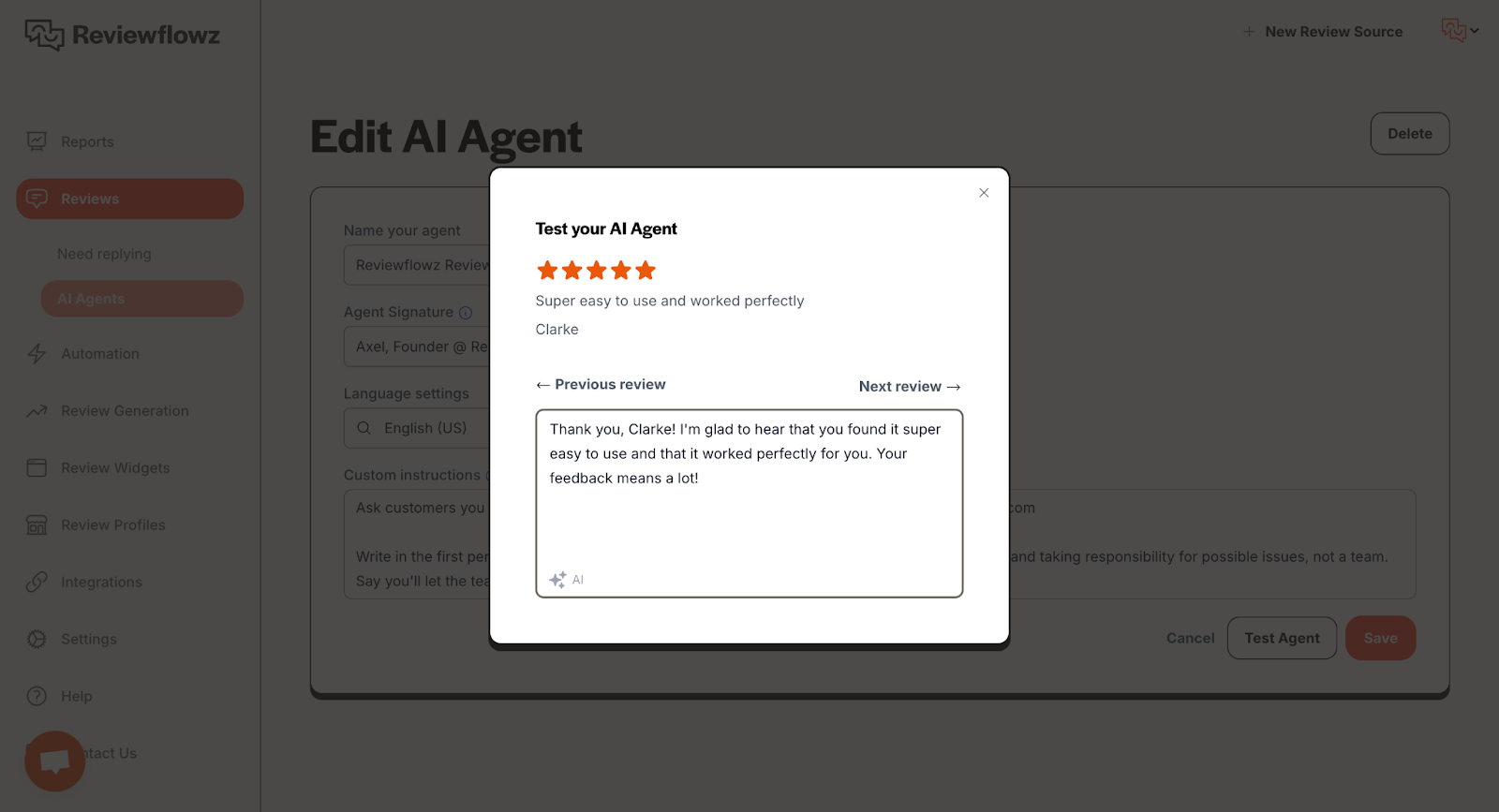
On Reviewflowz, you create reply automations where an AI agent posts replies autonomously to certain reviews and you can have a human use and validate AI suggestions for other reviews.
You can do this from the reviewflowz app, but you can also do it from any helpdesk, from Slack, from Microsoft Teams, or from email review alerts to avoid introducing a new tool into your team’s tech stack.
Reviewflowz is a European company, so it was born multilingual. Every AI model used can read and write in any language.
Automated AI review replies require the Premium plan.

Pricing is per review profile (location), and starts at $80 / month for one review profile, $120 for three review profiles, and $350 for 10 review profiles.
Unlimited AI replies are included. There are no extra AI credits.
#2 Birdeye

BirdEye is an all-in-one customer experience platform that includes review management, messaging, surveys, and social media management. Founded in 2012, it's one of the established players in the reputation management space with thousands of customers across multiple industries.
BirdEye offers AI-powered review responses as part of their platform. The AI can generate responses to reviews, but there's no indication they support context or memory management. This means the AI doesn't have access to your past replies when generating new ones, which can lead to repetitive responses over time.
The platform bundles review management with tons of other features - SMS messaging, webchat, surveys, and social media tools so if you’re after an all-in-one solution for marketing, this could be a good fit.
Prompt customization is available, but the platform's complexity means you're navigating through multiple feature sets to configure your AI replies.
BirdEye integrates with major CRM platforms including Salesforce and HubSpot. Team collaboration tools are built-in for managing reviews across multiple locations.
The platform supports multiple languages, though as a solution built before recent AI advances, it likely uses older translation methods rather than AI-native multi-lingual processing.
Pricing starts at $299/month per location on their Growth plan.
#3 Podium
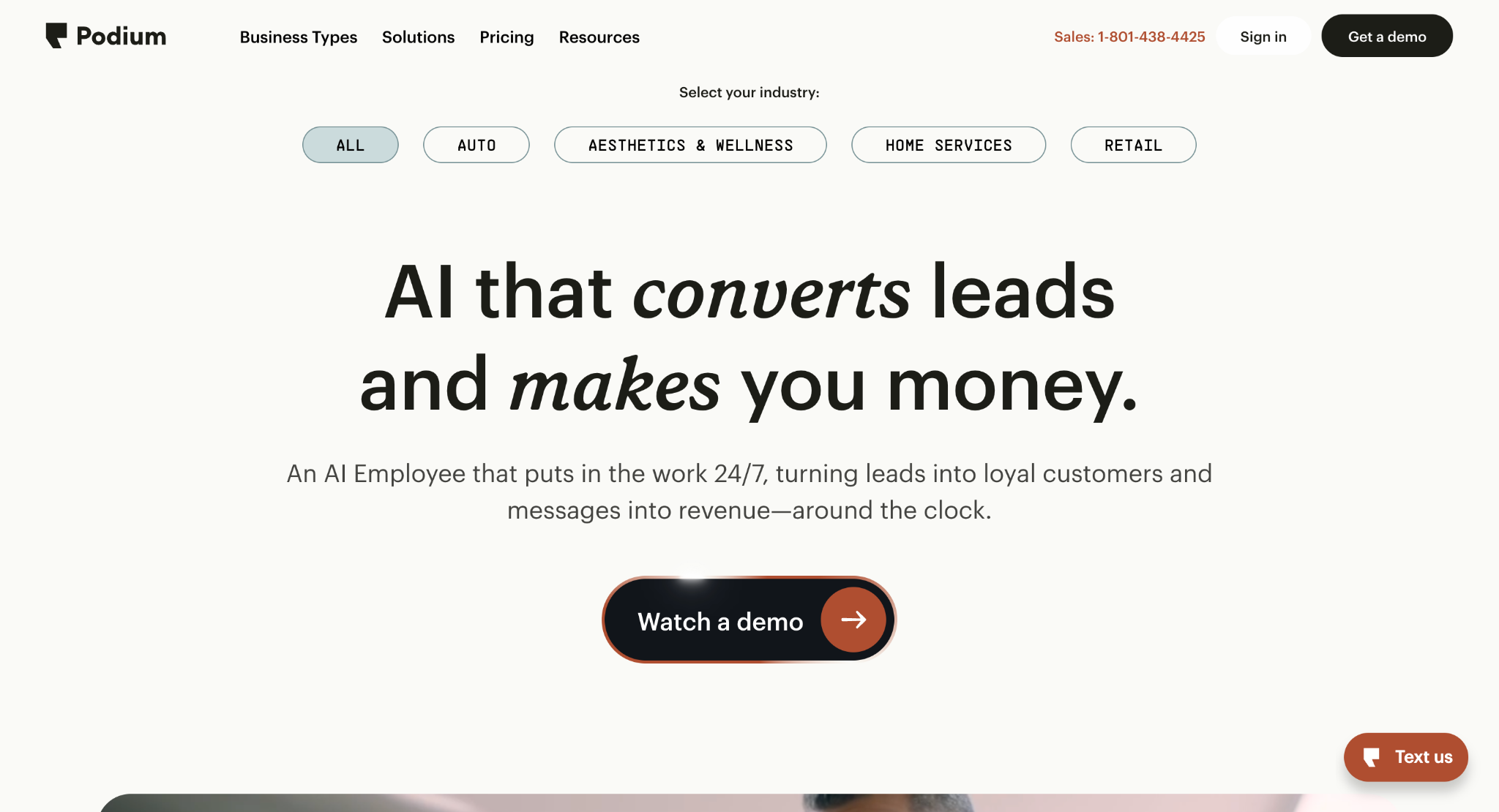
Podium is a customer communication platform built around SMS messaging. Review management is one of several features alongside webchat, payment processing, and customer messaging tools. The platform is designed to help local businesses communicate with customers primarily through text.
AI-powered review responses are available, but the feature is kind of secondary to Podium's core messaging capabilities. There's no indication of context or memory management for AI replies.
The platform's strength is consolidating customer communications - text messages, reviews, webchat, and payments - into a single inbox. For businesses that rely heavily on texting customers, this unified approach can streamline operations.
Prompt customization options aren't clearly documented. The platform is optimized for speed and mobile use rather than detailed AI configuration. Podium integrates with various business systems, though the focus is on communication channels rather than deep CRM or helpdesk integrations. The platform is clearly designed for English-speaking markets so don’t expect multi-lingual support.
Pricing isn't publicly listed and varies based on features and message volume. It starts from $450 per location according to multiple threads on Reddit.
#4 Reputation.com
Reputation.com is an enterprise-grade platform that handles reviews, social media monitoring, business listings, and reputation management across multiple channels. The platform is designed for large organizations managing hundreds or thousands of locations.
The platform offers AI-powered review responses as part of a comprehensive reputation management suite. Like most enterprise solutions, the AI generates responses based on the individual review without reference to your reply history.
Reputation.com's strength is its analytics and reporting capabilities. The platform provides detailed sentiment analysis, competitive benchmarking, and trend tracking across locations. For enterprises that need to report on reputation metrics to executive teams, these features can be valuable.
The platform includes integrations with CRM systems and business intelligence tools. However, the complexity of the platform means implementation typically requires dedicated onboarding and training.
Multi-language support is available and solid. Prompt customization for AI replies is available, but most changes require going through account management rather than being self-service. This adds significant friction to the iteration process.
Reputation.com is built for enterprises with complex needs across multiple business units and geographies. For smaller businesses or those focused primarily on AI review management, the platform offers far more than needed.
Pricing starts at $299/month but scales significantly based on features, location count, and usage. The pricing structure is complex and typically requires custom quotes.
#5 Reviewtrackers
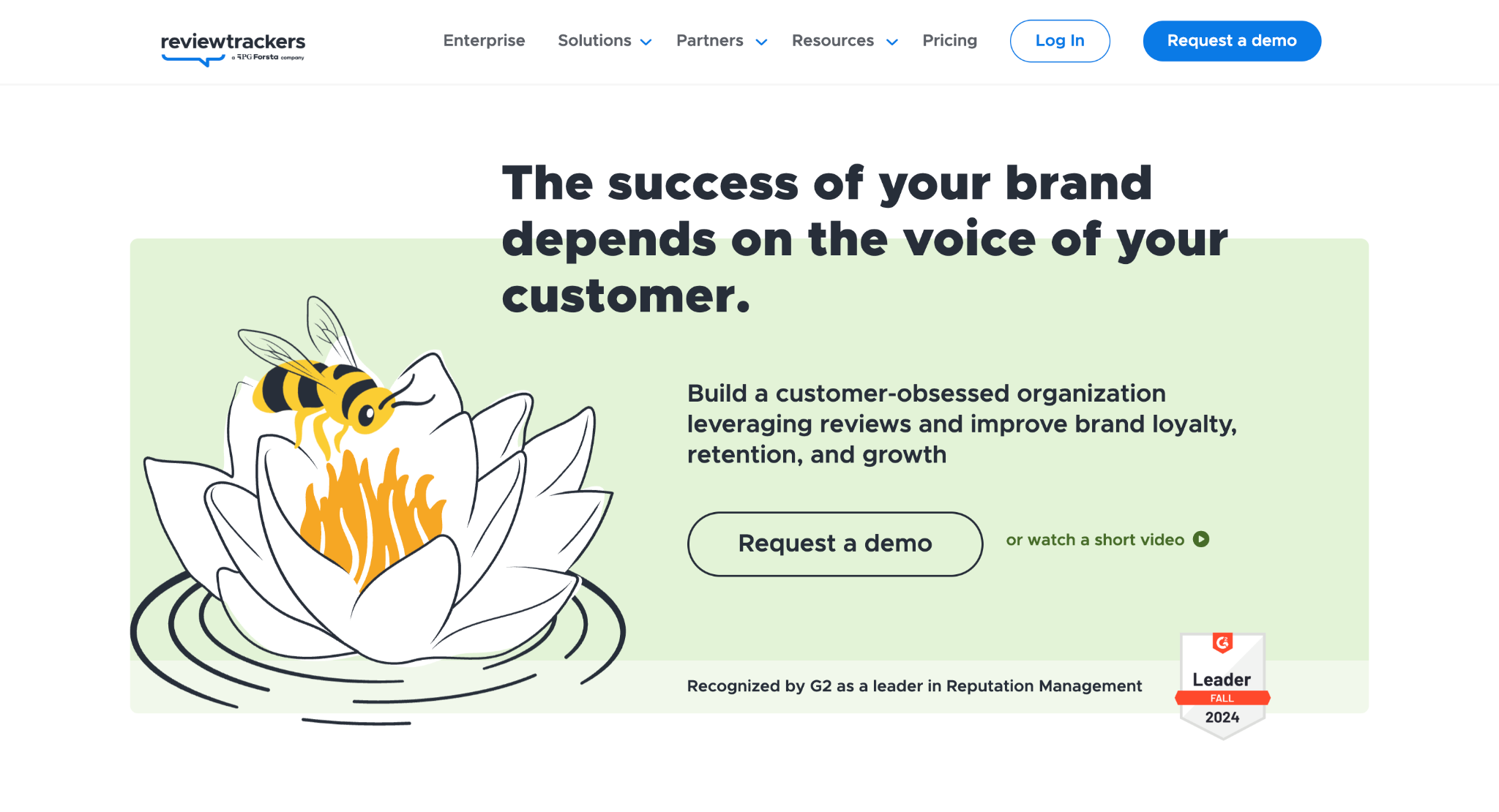
ReviewTrackers is a review monitoring and analytics platform that tracks customer feedback across 80+ review sites. The platform is built around monitoring, alerting, and analyzing reviews rather than generating them.
The platform offers AI-powered review response suggestions as part of its feature set. There's no indication of context or memory management, meaning the AI generates responses without access to your past reply history.
ReviewTrackers' primary strength is in monitoring and analytics. The platform provides competitor tracking to benchmark your reputation against others in your market, and sentiment analysis across your review portfolio. For businesses that want to understand review trends and competitive positioning, these analytics capabilities are the main value proposition.
On the pure review management side of things, reviewtrackers is among the best in class. The collaboration features are strong.
However, they have very few integrations, and the platform is primarily designed for English-language markets, so multilingual support is functional, but don’t expect your replies to sound like natives.
Pricing starts at $89 per month per location for their basic plans, but that doesn’t include review replies. The pricing can increase significantly for businesses with multiple locations or higher review volumes.
#6 BrightLocal

BrightLocal is a local SEO platform founded in 2014, focused on helping businesses and agencies improve their local search performance. The platform includes rank tracking, citation management, audit tools, and review management features.
BrightLocal added AI-powered review responses in March 2024. The feature allows users to generate responses by clicking a "Generate AI Response" button, which analyzes the review content and creates a suggested reply. Users can generate up to 3 different response options per review per 24-hour period. You can’t automatically post AI replies though.
The platform includes "Review Reply Templates" that can automatically respond to reviews based on star rating. For example, you can create a template that automatically sends a thank you message to anyone who leaves a 4-star review. These templates can be customized per business or client and can include personalization like the reviewer's first name.
BrightLocal can respond directly to Google Business Profile and Facebook reviews from within the platform. Responses are limited to 350 characters due to Google and Facebook API restrictions. For other review platforms, the system provides links to the review sites where you can respond manually.
The AI generates responses based on the individual review without reference to past replies, and multi-lingual management isn’t really their strong suit (template-based).
The platform integrates directly with Google Business Profile and Facebook Pages. Team collaboration features allow multiple users to manage reviews with status tracking.
Review management features, including template responses, are included in the Grow plan – which starts at $59 / month
#7 RightResponse.AI

RightResponse AI is a review management platform launched in 2024, built around generative AI for location-based businesses. Their CEO worked in healthcare previously, while
The platform offers a free AI review response generator with unlimited usage. Users can input business-specific context and information that the AI incorporates into responses. The platform can publish responses directly back to Google.
The AI review responses reference business facts and past review/response pairs when generating new responses, indicating some level of context awareness. However, the specifics of how context and memory management work aren't clearly documented.
The platform includes Google Maps rank tracking, competitor review analysis, and sentiment analysis features. Reviews are managed through a centralized dashboard.
For businesses that want fully managed service, RightResponse AI offers a "Done For You" option with human oversight.
Integration capabilities with helpdesks, Slack, Teams, or CRM systems aren't documented in their public materials. Multi-language support details are also not clearly specified.
Pricing starts at $8 per location on paper, but the platform uses credit-based pricing where each AI-generated response, sentiment analysis, or map rank check consumes credits.
From their simulator, basic usage for one location with 150 reviews per month would actually set you back $70 / month. $345 / month for 10 locations with 50 reviews each per month.
#8 Grade.us
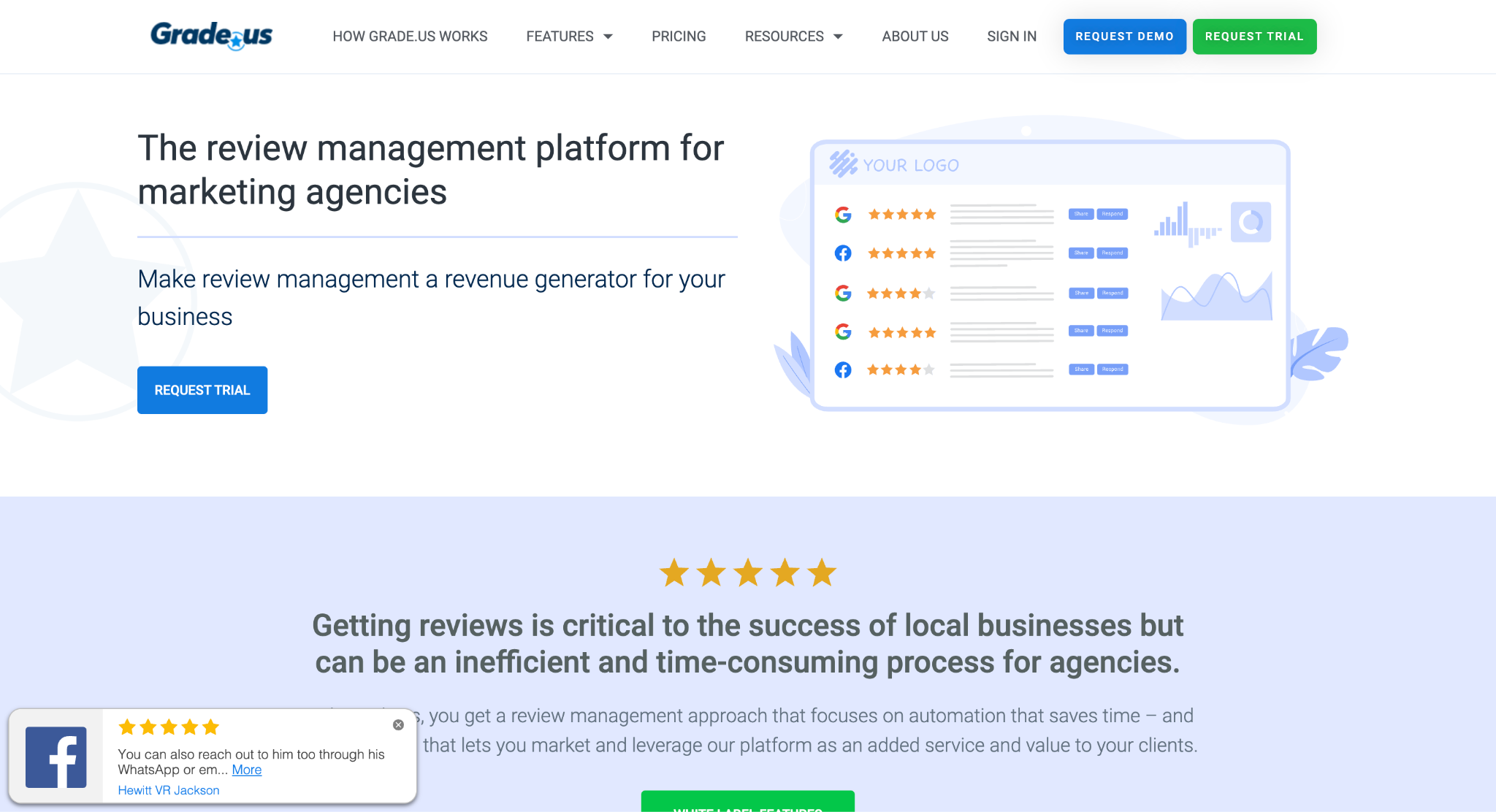
Grade.us is a white-label review management platform designed for agencies managing multiple clients. The platform was acquired by Alpine Software Group (ASG MarTech) in 2018 and now operates alongside GatherUp, which ASG acquired in 2019.
The platform is clearly geared a lot more towards review collection than pure management and it’s a little dated, but it gets the job done for a lot of agencies.
There’s no AI reply generation feature, but their review reply templates allow their clients to create automatic responses based on star ratings.
For example, you can set a template to automatically thank anyone who leaves a 4-star review.
Templates can be customized per client and include personalization like the reviewer's first name.
The platform integrates with WordPress for review widgets and can connect with various review platforms for monitoring. Team collaboration features allow multiple users to manage reviews with different permission levels, but there’s no integration with help desks or instant messaging software or anything along those lines. It’s really meant as the kind of software you spend hours on.
This is a US-only solution, there is no multilingual support.
Pricing is structured in three tiers: Professional for individual marketers, Agency for small to mid-sized agencies, and Partner for larger agencies and franchises. The platform uses per-seat (per client location) pricing with volume discounts as you add more locations.
#9 Yext

Yext is a digital presence platform for multi-location brands that includes listings management, local SEO, and review management as part of its broader suite.
Yext introduced AI-generated review responses in July 2023. The feature is called "Generative Review Response" and allows businesses to generate responses using customizable AI prompts.
Users can set parameters including language, tone of voice, number of sentences, and compliance policies. The platform includes a "Generative Response Playground" where users can test prompts against positive and negative review examples before deploying them.
The platform also offers template-based responses through "Templated Review Response," which uses sentiment analysis to populate dynamic text based on keywords and modifiers in reviews. Users can create templates with components like introductions, value statements, and closings that auto-populate based on review sentiment.
There's no indication of context or memory management in the AI system. Each response appears to be generated independently without reference to past replies.
The platform integrates with CRM systems to trigger review requests at specific moments in the customer journey. Multi-language support is available, with the AI able to respond in the language of the original review.
Pricing isn't publicly listed. Yext uses enterprise pricing with custom quotes based on features, location count, and usage.
#10 Reviews.io
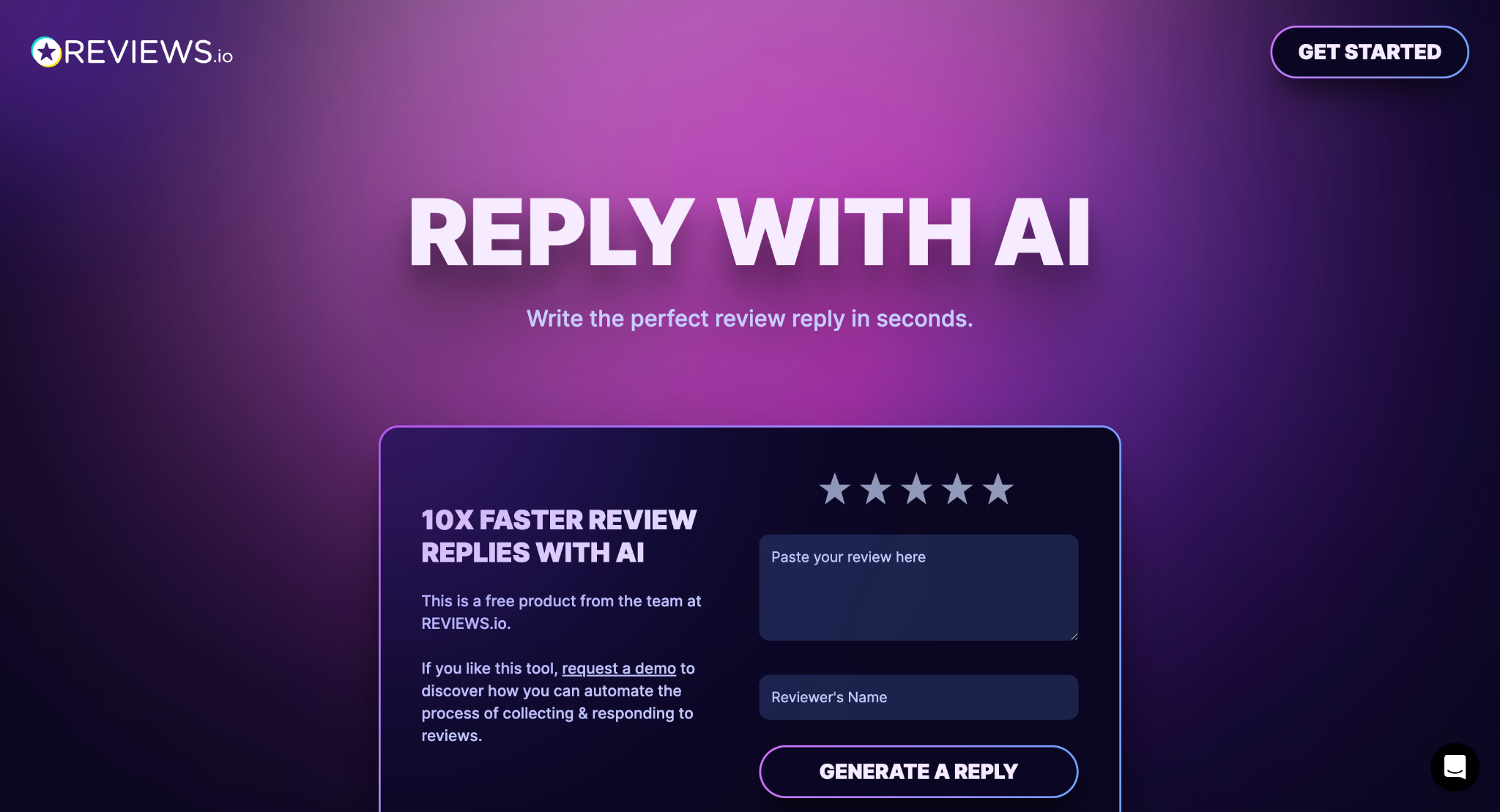
Reviews.io offers a free AI review response generator accessible at ai.reviews.io. The tool is provided by Reviews.io, a UK-based e-commerce review platform that's now part of Clearer.io.
The free tool allows users to generate review replies by inputting the review text and selecting parameters like tone and star rating. The AI generates responses that can be copied and used across various platforms. There's no usage limit on the free generator.
There's no indication of context or memory management in the free tool. Each response is generated independently based only on the single review input provided.
The tool doesn't include integrations, monitoring, or automation features. It's simply a generator where you manually paste reviews and copy the generated responses to post elsewhere. It’s also English only.
Pricing: The AI review response generator is completely free with no limitations on usage.








